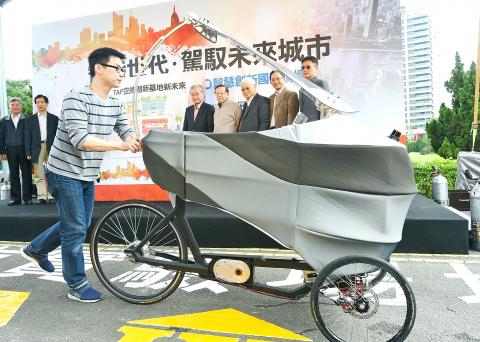A new autonomous tricycle — the result of a joint research effort by Taiwanese institutions and the Massachusetts Institute of Technology’s (MIT) Media Lab for smart city solutions — is to be tested in the Taiwan Air Force Innovation Base over the next 12 months.
“The smart autonomous tricycle could play a key role in future public transportation solutions in smart cities. We thank MIT for inviting Taiwan to participate in the research, development and manufacturing of the product,” Premier Mao Chi-kuo (毛治國) said at a news conference in Taipei yesterday.
The autonomous tricycle, dubbed the Persuasive Electric Vehicle (PEV), was developed and manufactured by the MIT Media Lab, the government-backed Institute of Information Industry (III, 資策會) and local bicycle manufacturer Pacific Cycles Inc (太平洋自行車).

Photo: Chang Chia-ming, Taipei Times
The 90 percent Taiwan-made smart vehicle was showcased at the Consumer Electronics Show in Las Vegas last week. The annual tech extravaganza concluded on Saturday.
MIT Media Lab research fellow and PEV project leader Michael Lin (林家樑) said the smart vehicle can navigate on its own or be directed by a passenger.
Lin said the smart tricycle is not meant to be personally owned, but would be the property of a city — similar to the YouBike system in Taipei.
“It can serve as a public bicycle with passengers and it can also be loaded with goods and travel autonomously,” Lin told reporters on the sidelines of the news conference.
The PEV uses radar, camera lenses, sensor modules and artificial intelligence deep learning, Lin said, adding that the vehicle can calculate the shortest route between two destinations and make a detour in accordance with realtime traffic.
“The tricycle fits in bicycle lanes and reaches speeds of 25kph,” he said. “The specifications of the vehicle are similar to electric bicycles.”
Lin said the research and development team had tested the vehicle by delivering goods in New York.
“PEV could conserve 60 percent of the energy of other autonomous vehicles and the driving distance is 40 percent shorter,” he said.
“Other than transportation solutions, governments could also use the vehicle for surveillance, uploading camera footage via data uploads and storing the information in the cloud,” Lin said.
“The vehicle is an example of the utilization of big data and the Internet-of-things,” he added.
Further testing of the vehicle would be needed because it must learn to become familiar with new environments, Lin said.
He said the MIT Media Lab is in talks with Pacific Cycles to produce 50 tricycles, with 10 of them to be tested in Taiwan and the rest to be tested in Singapore, Andorra, Germany and the US in the second half of the year.
“We anticipate people in Taipei will be able to test drive the PEV at the former air force base before the end of this year,” he said.
Lin said the Media Lab has invested more than US$2 million in the past few years into the project, adding that the team hopes to lower manufacturing costs for each bike to less than NT$200,000 (US$5,970).

Sweeping policy changes under US Secretary of Health and Human Services Robert F. Kennedy Jr are having a chilling effect on vaccine makers as anti-vaccine rhetoric has turned into concrete changes in inoculation schedules and recommendations, investors and executives said. The administration of US President Donald Trump has in the past year upended vaccine recommendations, with the country last month ending its longstanding guidance that all children receive inoculations against flu, hepatitis A and other diseases. The unprecedented changes have led to diminished vaccine usage, hurt the investment case for some biotechs, and created a drag that would likely dent revenues and

Macronix International Co (旺宏), the world’s biggest NOR flash memory supplier, yesterday said it would spend NT$22 billion (US$699.1 million) on capacity expansion this year to increase its production of mid-to-low-density memory chips as the world’s major memorychip suppliers are phasing out the market. The company said its planned capital expenditures are about 11 times higher than the NT$1.8 billion it spent on new facilities and equipment last year. A majority of this year’s outlay would be allocated to step up capacity of multi-level cell (MLC) NAND flash memory chips, which are used in embedded multimedia cards (eMMC), a managed

CULPRITS: Factors that affected the slip included falling global crude oil prices, wait-and-see consumer attitudes due to US tariffs and a different Lunar New Year holiday schedule Taiwan’s retail sales ended a nine-year growth streak last year, slipping 0.2 percent from a year earlier as uncertainty over US tariff policies affected demand for durable goods, data released on Friday by the Ministry of Economic Affairs showed. Last year’s retail sales totaled NT$4.84 trillion (US$153.27 billion), down about NT$9.5 billion, or 0.2 percent, from 2024. Despite the decline, the figure was still the second-highest annual sales total on record. Ministry statistics department deputy head Chen Yu-fang (陳玉芳) said sales of cars, motorcycles and related products, which accounted for 17.4 percent of total retail rales last year, fell NT$68.1 billion, or

In the wake of strong global demand for AI applications, Taiwan’s export-oriented economy accelerated with the composite index of economic indicators flashing the first “red” light in December for one year, indicating the economy is in booming mode, the National Development Council (NDC) said yesterday. Moreover, the index of leading indicators, which gauges the potential state of the economy over the next six months, also moved higher in December amid growing optimism over the outlook, the NDC said. In December, the index of economic indicators rose one point from a month earlier to 38, at the lower end of the “red” light.